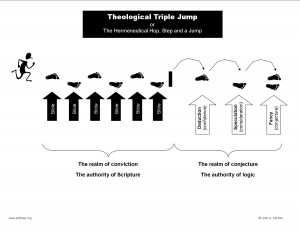You want to know and do God’s will? What is God’s will and what would it look like to do it? Usually the questions arise over something specific: Should I marry this person or that person? Should I become a pastor or a plumber? Things like that. But to know those things we need to approach the will of God first in a more foundational way. Instead of asking immediately should I live in Dallas or Denver, we need to ask if there a basic pattern to God’s will and how He reveals it. Is there something consistent we can look for whether we’re talking about choosing a marriage partner, an occupation, or a city to call home?
Yes, there is a basic pattern to how God’s will looks in all the decisions of our lives and in how He reveals His will to us. Jesus walked this journey on our behalf and in order to show us the way. He said, “I have come down from heaven not to do my will but to do the will of him who sent me” (John 6:38) and He confessed, “My food . . . is to do the will of him who sent me and to finish his work” (John 6:34). The most fundamental step toward discovering and doing God’s will is to settle that you were created for His will. You exist is to do what He has planned for you. Have you settled that? Is the most necessary thing for your continuance (your “food”) to know and do His will? Are all things subservient to that discovery and purpose? Isaiah said in describing Jesus before He ever took a step on this earth:
“It was the LORD’s will to crush him . . .and the will of the LORD will prosper in his hand.” –Isaiah 53:10
God willed that Jesus would suffer for our sins (“to crush him”) and only then would the fullness of His will find fulfillment through Him (“prosper in his hand”). Jesus died for us once for all, making the only atonement possible for our sins. We can’t duplicate that, and shouldn’t try. But there is something about the pattern of God’s dealings with Jesus that He wishes to reproduce in us as well. Notice this order: the cross (“crush him”), then a crown (“prosper”). Death, then resurrection. Suffering, then reward. Crushed, then crowned. Battered, then blessed.
Why this pattern? Why did Jesus travel this road for us? Not because of something in Him, but because of something in us. He died for our sins on the cross. But, even though we are forgiven and free of the debt of our sins, our sin nature continues to exist while in this world. To deal with the indwelling nature of sin, God takes us down the same path He led His Son along. We can’t pay the debt of our sins, but we must die to sin—the inward nature that resists God.
We can’t truly enter into the enjoyable part of God’s will (“prosper in his hand”) until God deals with our sin nature (“crush him”), for it repeatedly blocks our way. Thus, at this present moment, God is orchestrating some of the events of your life in a way that is unpleasant. One (perhaps among many) purpose for this is that He is wooing you to choose His will rather than your own will.
What is God’s will? That in everything and at every moment you choose His will over your own. Didn’t Jesus say, “Not my will, but your will be done”? Could it be that what you are facing presently is in some respect designed to bring you to that same posture of heart? The cross hurts. The crushing of self is never pleasant. But it is God’s will. Are you wondering why things have to be so hard? At least in part, things are hard because your self-will is hard. You want your way! So do I! That is the problem. Remember, the required heart-posture for discovering the God’s will is this: I want His will more than I want my own. Jesus willingly walked this road for us. He didn’t have to—for He had been in harmony with the will of the Father from all eternity. But He stepped into time and space and followed His Father’s will. And it led Him to a garden where He prayed in agony to choose the Father’s will over His own will. The result was resurrection from the dead and elevation to a place He could not and did not even enjoy prior to His earthly ministry—for now it was His not simply by divine right as the Son of God, but now by redemptive right as the Savior of the world!
“… taking the very nature of a servant … he humbled himself and became obedient to death – even death on a cross! Therefore God exalted him to the highest place and gave him the name that is above every name …” –Philippians 2:7, 8, 9
We must travel the same path to find and do His will. Though initially the path is painful, in the end we will find it to be “his good, pleasing and perfect will” (Rom. 12:2b). So we are commanded: “Do not conform any longer to the pattern of this world” (Rom. 12:2a). This is the crushing. We have all allowed the world to “squeeze [us] into its own mould” (Phillips). Breaking that pattern is painful, but we can never know and do the will of God until it is accomplished. This is not accomplished in a moment of time (though it begins there), but is a life-long process. Yet we need not wait a lifetime to “be transformed by the renewing of your mind” (knowing the will of God). And the promise is “Then you will be able to test [identify] and approve [rejoice in] what God’s will is—his good pleasing and perfect will” (Rom. 12:2b).
God wants you to know who to marry, what occupation to take up, and what city to live in—but more than that He wants to own you, from the heart. Then you will know and rejoice to do … whatever His will is.

